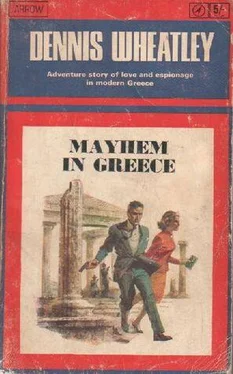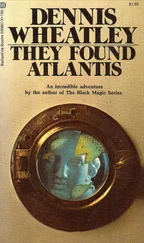As olive trees live for many hundreds of years, it is just possible that the quite slender tree now growing on the Acropolis may be an offshoot from the root of the first tree planted there in Athene's honour. However unlikely that may be, Robbie had never speculated on the question. It was enough for him that the tree was the symbol of the great goddess.
Although it was still early in the season, quite a number of tourists were rambling among the fallen monoliths scattered over the great plateau, and three conducted tours, including one of school-children, were making the round of the temples. For some minutes, Robbie had to wait until no one was near enough to notice what he was doing. Then he quickly pulled a small medicine bottle from his trouser pocket. Before leaving the Embassy, he had paid a visit to the dining room and filled it with his uncle's port. Now he quickly poured the contents of the bottle, as a libation to the goddess, at the root of her tree.
Shutting his eyes, he remained standing there, waiting for counsel. But not, as had been the case on previous occasions, for inspiration as to how to proceed with his book. It was with that intent that he had started out, but he had since decided that he would not be able to go on with his book until he had freed his mind from the thoughts that had been agitating it for the past twenty-four hours.
Silently now, he prayed to the goddess either to assure him that he would be wasting his time in pursuing further the matter of the Greco-Czech agreement, or that it would be worth his while to do so.
A gentle breeze rustled the leaves of the olive tree, but to Robbie, through these rustlings, a quiet voice spoke.
'Strange mortal, who in these times has been granted the wisdom to understand that the gods can never die, and still have power to aid those who call upon them at their shrines. For the sake of my country and for yours, you must take up this quest, and whate'er befall, pursue it to the bitter end.'
4
'When First we Practice to Deceive'
The gentle rustling of the leaves was suddenly drowned by a strident voice. Robbie felt sure that the goddess had been going on to whisper counsel to him, but he caught no further word. A conducted tour composed of Germans was approaching, and their fat guide was reeling off facts and figures for them in a monotonous bellow, as they advanced from round the south-east side of the Erechtheum.
Robbie was furious at the interruption, but there was nothing he could do about it; so, to get away from the crop-headed Herren and well-upholstered Frauen, who were now surrounding him like an incoming tide, he broke through the group and clambered up the steep steps in front of the main entrance to the temple.
Standing between the twenty-foot-high Ionic columns of the portico, he could look down over the nearby north wall of the Acropolis. Far below him lay the principal ruins of the ancient city: the great open area of the Agora where, in the narrow streets between a dozen temples, the Athenians had held their markets; the Theseum; the Library of Hadrian and the Tower of the Winds. But he looked down on them with unseeing eyes. For the moment, he could think of only one thing: he was now irrevocably committed.
As soon as the group of Germans moved on, he hastened back to the Sacred Olive Tree. Again he stood before it, with closed eyes, and prayed for guidance. Again the leaves rustled in the gentle breeze, but this time their rustling formed no pattern of whispered words. In vain he strained his ears, and reluctantly accepted that the goddess could no longer be there only when he heard footsteps close behind him and a voice with an American accent saying:
'Could you tell us, please, what this little tree would be doing here?'
It was a tall young man with three cameras slung about him, and a very pretty girl leaning on his arm. Robbie had little doubt that they were honeymooners, and he gladly told them about Athene's tree. He knew the Acropolis as well as any professional guide, and could talk much more interestingly about its ruins. At other time, he would have offered to take them round, but he was still too overcome by the thought that one of the greatest of the Immortals had actually spoken to him to give his mind to anything else. Politely excusing himself, he hurried towards the north-east extremity of the plateau.
There, on the highest point of its slope, a large circular platform had been constructed, with a waist-high wall round it, from which the cliff dropped sheer. Above it, from a flagstaff, floated the flag of Greece, and this spot was known as the Belvedere for it gave the finest view of all from the Acropolis. To the north, the countless houses of the modern city stretched into the misty distance in the valley between Mount Poilikon and Mount Pendelikon. Nearer, one could pick out the principal buildings of the fashionable quarter; the Royal Palace facing on to Constitution Square; Venizelou Street with its fine university buildings; and the main boulevard, Stadium Street, running parallel to it. Beyond them, nearly two miles away, but still within the city, Mount Lycabettus, shaped like a sugar-loaf and nearly twice the height of the Acropolis, towered up, the sun glinting on the roofs of the monastery that crowned its summit. To the west lay the National Park, and across the river the modern Stadium, both, in the extraordinarily clear atmosphere that is peculiar to Greece, looking so close that one could have thrown stones into them.
The Belvedere was a favourite haunt of Robbie's to laze and dream, but now he was thinking hard of a way in which to set about the mission that the goddess had imposed upon him. He decided that it was most unlikely that he would get any more out of Nassopoulos, even if the Minister were aware, which seemed doubtful, of the Czech's secret intentions. That left only the Czechs themselves as a source of information.
To pay a visit to the Czech Legation and ask someone there would obviously be a waste of time. That being so, the only course that remained seemed to be to think of some way to worm himself into their confidence.
It struck him then that perhaps, after all, the Czechs might have real grounds for believing that they could strike oil in Greece. Science, the world over, had advanced by leaps and bounds during the past ten years. Russia often used her satellites as cover for her own activities, and no one could deny that the Russian scientists, as far as anyone in the world, had recently penetrated the secrets of Nature. Perhaps some of them had devised an entirely new method of detecting various types of geological formation and, all unsuspected by the Greeks, oil did lie below their rugged mountains.
Spurred to sudden activity by this idea, Robbie left the Belvedere, walked as swiftly as he could across the uneven, pitted stones that formed the surface of the Acropolis, hurried down the slope and took one of the taxis that were always waiting in the car park for a fare. Jumping in, he told the driver to take him back into the city and stop at the nearest telephone kiosk.
From the kiosk he rang up the office of the United Kingdom
Petroleum Company, and asked for Mr. Luke Beecham, the Company's chief representative in Greece. Beecham's work often entailed meetings with the Commercial Attache, and he frequently paid visits to the Embassy, both on business and as a guest. He was a bachelor in his early forties, so was much older than Robbie, but he was a charming and kindly man and had often gone out of his way to be pleasant to the Ambassador's shy and somewhat ungainly nephew, to whom most people of any standing were inclined to speak only politely, then ignore. He had, too, several times asked Robbie to small parties at his fiat, and had taken pains to draw*him out.
In consequence, Robbie felt that Luke Beecham was a man whom he could trust, and that in the present matter it was a lucky break for him that the only man he really looked on as a friend should happen to be an expert on oil. In fact, he thought it might even be an indication that Athene meant to help him in his quest.
Читать дальше












